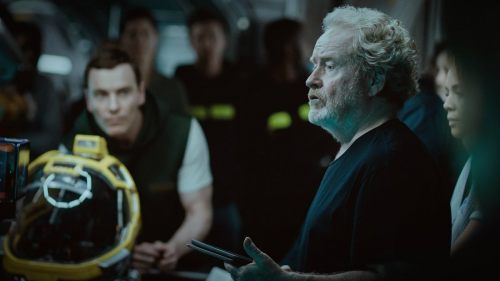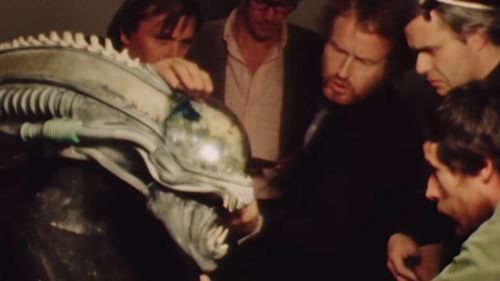A Scientist’s Look At THE MARTIAN
It’s a dangerous thing, demanding more sci from your sci-fi. It sounds great on paper, and it’s almost de rigueur these days for science fiction filmmakers working in the near-future timeframe to pay lip service to how rooted in real-world science their films are. We’ve seen a parade of these pictures in the last decade: Moon, Interstellar, Gravity. Their directors all played up how closely the scripts hewed to the real science of the subject matter, and those same scripts all eventually abandoned that scientific purity in service of story. And, as fans of film, who are we to argue? Do we really want to see drama that borders on documentary? The scientist in me is probably tempted to answer “yes,” but the civilian who spends most of his free time hanging out with liberal arts types is inclined to pants that first guy and take his lunch money. And, so, we’re inclined to (perhaps grudgingly) admit that the perfect combination of science and story will probably never come along.
Well, it came along.
The Martian is the best work of real-world science fiction in decades. This is largely due to author Andy Weir’s novel, to which the movie closely adheres. But a straight adaptation of the source material would have never worked on the screen, and an equal measure of the credit must be given to screenwriter Drew Goddard. Goddard has done a brilliant job of trimming the fat from Weir’s work - and there’s fat aplenty in the novel - to find a tight story that, with rare exception, never strays too far from the exceptional technical rigor that Weir put into the novel.
Minor spoilers for both the novel and the film follow, so be warned. The Martian was originally self-published by Weir as a serial novel on his own website. At the time, Weir was a working programmer kicking around the idea of a story involving an astronaut stranded on Mars. As an avowed space geek, he carefully researched what a near-future manned Mars mission would look like. He wrote software, in support of the novel, to calculate orbital trajectories, and he carefully extrapolated what leavings a stranded astronaut on Mars would have to work with and what problems might present themselves. I was fortunate enough to attend a talk by Weir several months before the movie’s premiere, and he outed himself on being wrong on only two major accounts: (1) the physics of the Mars atmosphere are such that no Martian storm could ever generate the gale-force wind loads that instigate astronaut Mark Watney’s troubles, and (2) percholates in the Mars soil make it generally too toxic to support agriculture.
I think we can agree to let those slide.
And yet, in that same talk, Weir himself admitted that “no one would ever accuse this book of being literature.” As a freshman novelist, especially one coming from a more technical background, Weir has done an outstanding job. The Martian is an engrossing read, but it has a tendency to play as a text-based adventure game: Your habitat has now depressurized. What would you like to do? Weir derives so many conundrums for Watney and back-solves for their solutions that, eventually, even I grew tired of the onslaught of manufactured adversity - appealing though Watney’s solutions always were on a technical level.
And that’s exactly where Goddard’s treatment of the source material really shines. The novel needed a thorough thinning out, and Goddard has done just that. He’s reeled in Weir’s tendencies to sling lightning bolt after lightning bolt at Watney, and he’s focused the script on the dilemmas that give us the most insight into Watney’s character. The deeply nerdy Watney (clearly a surrogate for Weir himself) can’t help but find the game in each of his predicaments after his moments of panic and despair have passed. He’s the best example of science as play that we’ve ever seen in film, and I am overjoyed that he may go on to inspire a whole generation of youngsters the way that Apollo 13 inspired my cohort of nascent scientists and engineers.
So, is excited scientist plus veteran screenwriter really a new formula for success in science fiction films? I’d argue no. After being deeply disappointed by Interstellar, despite having my hopes buoyed by director Christopher Nolan’s assurances that the film was rooted in hard theoretical physics, I decided to visit its source material in the form of science advisor (and CalTech theoretical physicist) Kip Thorne’s book The Science of Interstellar. It’s clear that Thorne thought deeply about each narrative scenario presented to him by Nolan, worked out the supporting science and presented it back to the director to use as he saw fit. The bulk of Thorne’s contributions ended up informing the movie’s impressive visuals; where Thorne was unable to bend the science to fit the story Nolan wanted to tell, the director was quick to jettison physics in favor of narrative.
That’s certainly a fair approach, but it falls short of that perfect marriage of science and fiction Interstellar sold itself as. As clunky as Weir’s novel tends to be at times, the charm of the The Martian comes not from a scientist providing consultation on fiction but by actually trying to write that fiction himself. That Goddard’s screenplay adheres so closely to the best parts of the novel bears testament to Weir’s attempts to craft a narrative, and Goddard’s understanding of what makes a good story truly elevates the source material. That’s not to say that Goddard’s influence is entirely as a curator or that it’s entirely positive from a scientific perspective - the last act in particular strains scientific credulity at a few points, and it involves the the cinematic Watney carrying out a plan that the literary Watney was wisely talked out of by the crew of the Hermes. But Goddard and Matt Damon (as Watney) bring a level of humanity to the stranded astronaut that’s lacking in the novel.
As a film, The Martian is alchemy. 2001, the gold standard for science-heavy sci-fi, maintains a distance in its narrative befitting its lofty ambitions. But The Martian remains so human, and so accessible despite its painstakingly technical roots, that I’m tempted to call it a miracle. Weir, Goddard, Damon and director Ridley Scott have created something truly special.
Read Devin's review of the film here.



